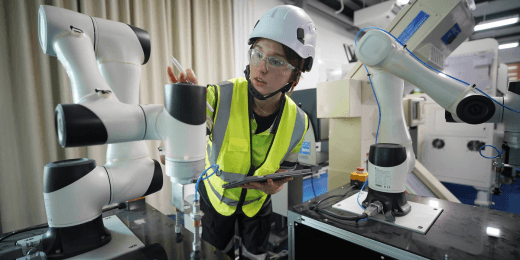Digital Transformation Training for Organizational Innovation
Learn more about digital transformation training, why it’s important, and how to implement it in your organization.

Published 27 Jun 2025
Article by
4 min read
What is Digital Transformation Training?
Digital transformation training is the structured process of educating and equipping employees and organizations with the skills and knowledge necessary to navigate and implement digital technologies and strategies effectively. This training covers topics including digital strategy, emerging technologies, analytics, and cybersecurity to help drive innovation, reduce costs, and enhance customer experiences.
Importance
Digital transformation can be tricky for organizations, as adopting digital solutions to enhance operational efficiency and productivity is a major change for most teams. This is why it’s critical to ensure everyone’s digitally literate and able to utilize the new solutions to their highest potential.
Ensuring the team is properly trained for digital transformation is also a great way to achieve operational excellence. This is because being able to effectively implement digital transformation strategies in every process can lead to enhanced organizational productivity.
Achieve operational excellence
Cultivate a culture of excellence with our digital solutions that enhance efficiency, agility, and continuous improvement across all operations.
Key Aspects
Digital transformation training looks different for every organization depending on their industry, needs, and the type of digital solutions they’re adopting. However, managers should include these critical aspects in their training sessions:
Developing a Digital Mindset
Training should emphasize the importance of embracing change, being open to new technologies, and fostering a culture of continuous learning and innovation. This mindset shift is foundational to any successful digital transformation initiative.
Understanding and Integrating Technology
Comprehensive training covers the understanding and application of key digital technologies such as cloud computing, artificial intelligence, machine learning, data analytics, and cybersecurity. These technologies are fundamental to driving digital transformation and are crucial for both IT and business leaders to master and integrate effectively into their organizations.
Change Management
Training should include modules on how to lead through change, manage resistance, and build a supportive digital culture. Leaders should be equipped with the skills to inspire and guide their teams through the transformation process.
Operational Modernization
Training programs in digital transformation also focus on modernizing business processes and operations. This includes learning how to leverage digital tools to streamline workflows, reduce operational costs, and improve efficiency. Trainees are taught how to implement process improvements that support the broader goals of digital transformation.
Data-Driven Decision Making
Digital transformation training often includes modules on data literacy and analytics. Participants learn how to collect, analyze, and use data to drive business decisions. This aspect of training helps organizations become more data-driven, allowing them to make more informed and strategic decisions based on actionable insights.
Best Practices
While the way you set up your digital transformation varies on a number of factors, there are a few best practices to keep in mind. Here are a few tips to remember when creating a digital transformation training program:
Emphasize practical applications.
Training programs should incorporate real-world projects and scenarios that allow participants to apply what they learn in practical settings. This hands-on approach helps solidify knowledge and ensures that skills are immediately relevant and useful in the workplace.
Encourage collaboration.
Digital transformation affects the entire organization, so training should include exercises and projects that promote cross-functional teamwork and communication. This helps break down silos and ensures that all parts of the organization are aligned and working towards common goals.
Integrate soft skills development.
Digital transformation is not solely about technology; it also requires strong interpersonal skills to navigate the changes. Training programs should, therefore, focus on developing soft skills that enable employees to work effectively in digital environments.
Promote experimentation.
Encouraging a culture of experimentation helps employees feel comfortable trying new ideas and technologies without fear of failure. Organizations can also leverage the features and functionalities of digital transformation platforms for streamlined implementation. This can lead to innovative solutions and continuous improvement.
Facilitate continuous learning.
Digital transformation is an ongoing process, not a one-time event. Training programs should promote a culture of continuous learning, with opportunities for ongoing education and skill development. This includes staying updated with the latest technological trends, continuously assessing the organization’s readiness for agile transformation, and adapting training programs as new technologies and methodologies emerge.
The Significance of Mobile Learning in Digital Transformation Training
Applying mobile learning during digital transformation training is a great way to train employees and familiarize them with the digital landscape. On top of that, it allows trainees to attend and complete lessons on their own terms. This makes it easier to train remote teams, ensure uniform training across various locations, and track progress digitally.
Digital training platforms like SafetyCulture Training allow organizations to take their training programs to the next level. This platform allows managers to create and customize training courses, assess workers, and provide employees with a knowledge library they can access anytime.
Conduct Effective Digital Transformation Training with SafetyCulture
Why Use SafetyCulture?
SafetyCulture is a mobile-first operations platform adopted across industries such as manufacturing, mining, construction, retail, and hospitality. It’s designed to equip leaders and working teams with the knowledge and tools to do their best work—to the safest and highest standard.
Streamline processes, eliminate bottlenecks, enhance resource utilization, and build an agile and scalable infrastructure with SafetyCulture. Strive for operational excellence to boost competitive advantage, foster sustainable growth, and deliver long-term value.
✓ Save time and reduce costs ✓ Stay on top of risks and incidents ✓ Boost productivity and efficiency ✓ Enhance communication and collaboration ✓ Discover improvement opportunities ✓ Make data-driven business decisions
Related articles
Operations
Business Processes

Understanding the Importance of Process Automation Reliability
Learn how reliable process automation is key to safe, consistent operations and how it minimizes quality and compliance risks.
Logistics
Operations

Transportation and Logistics: What’s the Difference?
Learn about the importance of transport and logistics within the supply chain and how it is used in business operations.
Logistics
Operations

An Overview of Transport Network Analysis
Learn about transport network analysis and how network-level insight improves reliability and reduces operational risk.